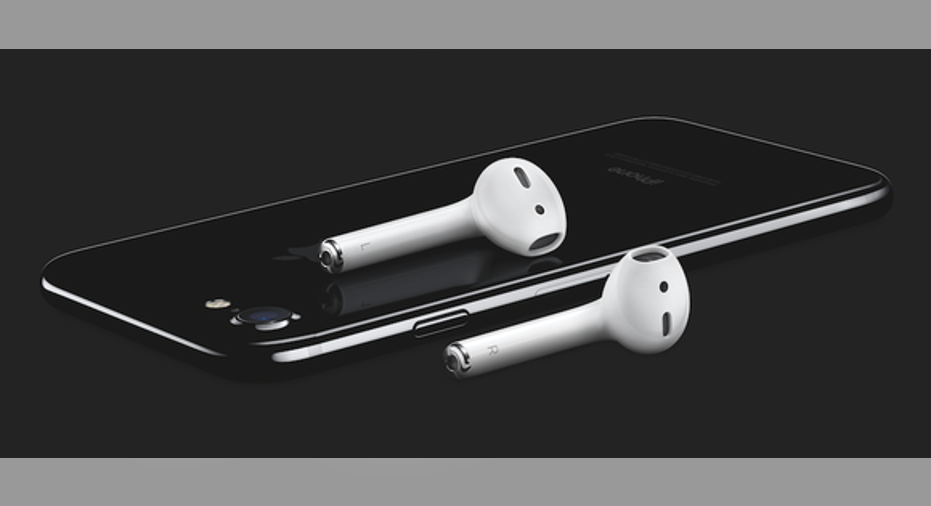Maybe Apple, Inc.'s AirPods Aren't Doing As Well As You Think

Image source: Apple.
Last week, e-commerce analytics tracker Slice Intelligence estimated that Apple (NASDAQ: AAPL) was already dominating the market for wireless headphones, thanks to the launch of AirPods in December and supplemented by Beats' existing strong position in the market. Specifically, Slice was estimating that Apple was grabbing an impressive 40% of the wireless headphone market between AirPods and Beats combined. If that sounded too good to be true considering the severe supply constraints that AirPods are currently suffering from -- well, maybe it really was.
Survey says
Market researcher NPD has now released some data that questions Slice's estimates (via CNET). According to NPD's data for December 2016, Apple currently only has 2% unit share of the wireless headphone market, while Beats has 25% unit share. Given Apple's premium pricing for both products and brands, that translates into 3% revenue share for AirPods and 46% revenue share for Beats. Here's how some of the other top players fared for the month, ranked by revenue share.
|
Company/Brand |
Unit Share |
Revenue Share |
|---|---|---|
|
Beats |
25% |
46% |
|
Bose |
8% |
19% |
|
LG |
10% |
7% |
|
Sony |
7% |
6% |
|
Apple |
2% |
3% |
Data source: CNET.
For reference, NPD estimates that a year ago in December 2015, Beats was able to grab 24% unit share and 49% revenue share, comparable performance to this time around; Beats' strong position in the premium headphone space was one key reason why Apple acquired the company. More importantly, Beats was able to maintain its position even as the market has been evolving and shifting toward wireless Bluetooth headphones, so Beats is keeping up with the times.
Why the difference?
That's a pretty drastic discrepancy between Slice's numbers and NPD's numbers for AirPods -- 26% compared to 3% in revenue share, respectively. There are a few possible explanations.
For starters, Slice only looks at online sales and its methodology revolves around analyzing e-receipts that are aggregated from a panel of over 4.4 million online shoppers (the sample sizes for Slice's estimates ranged from about 2,900 shoppers to over 350,000 shoppers). NPD, in contrast, also includes brick-and-mortar sales along with online sales, which should provide a more comprehensive view of the market. While e-commerce has been growing for years, brick-and-mortar retail still comprises a meaningful chunk of the market, so ignoring that part of the market can lead to some faulty conclusions.
Additionally, given Slice's methodology of tracking e-receipts, it's not clear how unfulfilled orders are treated. It's possible that Slice picked up on a surge of online orders following the launch, but AirPods are still suffering from severe supply constraints and new orders don't ship for six weeks. It seems conceivable that a lot of the sales that Slice is tracking may not be filled yet, and only tracking e-receipts could artificially inflate the figures even if many of those customers haven't actually received their products.
Still impressive
Here's the thing: Even if investors go with NPD's far more conservative figures, it's still an impressive debut for AirPods. Keep in mind that AirPods launched in mid-December, and yet despite constraints and only being available for half of the month, they were able to grab 2% unit share and 3% revenue share in a fairly large market. And those numbers only go up from here.
10 stocks we like better than Apple When investing geniuses David and Tom Gardner have a stock tip, it can pay to listen. After all, the newsletter they have run for over a decade, Motley Fool Stock Advisor, has tripled the market.*
David and Tom just revealed what they believe are the 10 best stocks for investors to buy right now... and Apple wasn't one of them! That's right -- they think these 10 stocks are even better buys.
Click here to learn about these picks!
*Stock Advisor returns as of January 4, 2017
Evan Niu, CFA owns shares of Apple. The Motley Fool owns shares of and recommends Apple. The Motley Fool has the following options: long January 2018 $90 calls on Apple and short January 2018 $95 calls on Apple. The Motley Fool has a disclosure policy.



















